|
|
|
ADVERTISEMENTS
|
|
PREMIUM
- HAPPY HOLIDAYS!
- Siliconeer Mobile App - Download Now
- Siliconeer - Multimedia Magazine - email-Subscription
- Avex Funding: Home Loans
- Comcast Xfinity Triple Play Voice - Internet - TV
- AKSHAY PATRA - Bay Area Event - Sat. Dec 6
- Calcoast Mortgage - Home Loans
- New Homes in Silicon Valley: City Ventures - Loden Place - Morgan Hill
- Bombay to Goa Restaurant, Sunnyvale
- Buying, Sellling Real Estate in Fremont, SF Bay Area, CA - Happy Living 4U - Realtor Ashok K. Gupta & Vijay Shah
- Sunnyvale Hindu Temple: December Events
- ARYA Global Cuisine, Cupertino - New Year's Eve Party - Belly Dancing and more
- Bhindi Jewellers - ROLEX
- Dadi Pariwar USA Foundation - Chappan Bhog - Sunnyvale Temple - Nov 16, 2014 - 1 PM
- India Chaat Cuisine, Sunnyvale
- Matrix Insurance Agency: Obamacare - New Healthcare Insurance Policies, Visitors Insurance and more
- New India Bazar: Groceries: Special Sale
- The Chugh Firm - Attorneys and CPAs
- California Temple Schedules
- Christ Church of India - Mela - Bharath to the Bay
- Taste of India - Fremont
- MILAN Indian Cuisine & Milan Sweet Center, Milpitas
- Shiva's Restaurant, Mountain View
- Indian Holiday Options: Vacation in India
- Sakoon Restaurant, Mountain View
- Bombay Garden Restaurants, SF Bay Area
- Law Offices of Mahesh Bajoria - Labor Law
- Sri Venkatesh Bhavan - Pleasanton - South Indian Food
- Alam Accountancy Corporation - Business & Tax Services
- Chaat Paradise, Mountain View & Fremont
- Chaat House, Fremont & Sunnyvale
- Balaji Temple - December Events
- God's Love
- Kids Castle, Newark Fremont: NEW COUPONS
- Pani Puri Company, Santa Clara
- Pandit Parashar (Astrologer)
- Acharya Krishna Kumar Pandey
- Astrologer Mahendra Swamy
- Raj Palace, San Jose: Six Dollars - 10 Samosas
CLASSIFIEDS
MULTIMEDIA VIDEO
|
|
|
|
|
NEWS DIARY
Tata Group Gives $50 Million to Harvard Business School
Teen Stands Tall as World's Shortest Man Looks
Bangladesh, India Most at Risk from Climate Change
Back to School
Karachi Death Toll 52
U.S. Applauds India's Election
Fonseka Loses Seat
Malaria Kills 200K Yearly
Rights Groups Won’t Testify
Work Begins on Jewish Center
Polls Open in Bihar
Tata Group Gives $50 Million to Harvard Business School
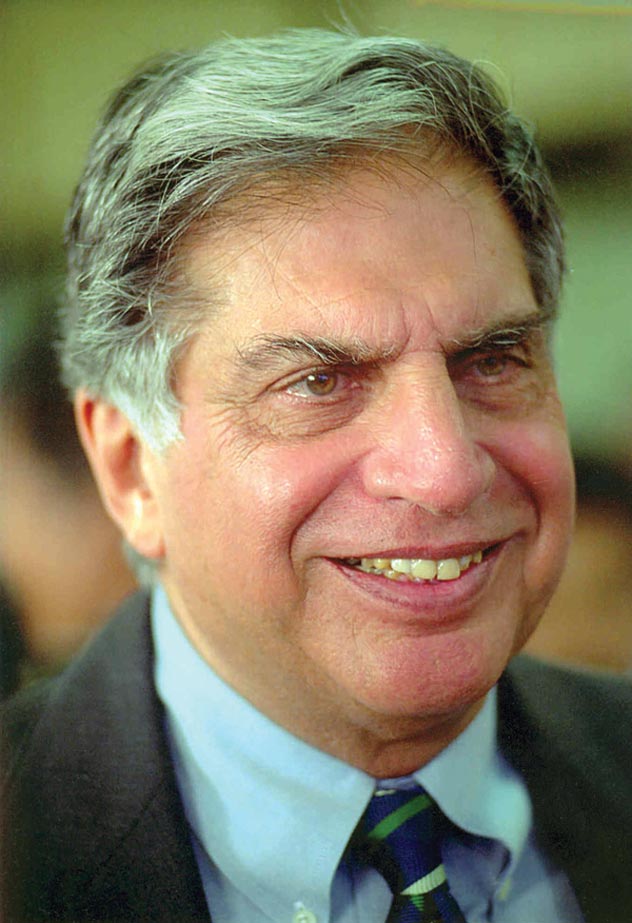 Ratan Tata Ratan Tata
India's Tata Group has given $50 million to Harvard Business School to fund a new academic and residential building on its campus, the largest gift received by the business school from an international donor in its 102-year-old history.
The gift comes from Tata Companies, the Sir Dorabji Tata Trust and the Tata Education and Development Trust, the philanthropic entities of the group.
Ratan Tata, chairman of Tata Sons, attended Harvard's advanced management program — one of three comprehensive leadership programs offered by the Harvard Business School's executive education in 1975.
He had also received the School's highest honor, the Alumni Achievement Award, in 1995.
The school said it will use the $50 million gift from the Tata Group to fund a new academic and residential building on its campus for participants in its broad portfolio of Executive Education programs.
The school hopes to break ground for Tata Hall next spring. It is expected to be open for use by late 2013.
Calling it a privilege and a pleasure to "give back to Harvard a little bit of what it gave to me," Tata said he hoped the new facility would encourage and inspire future leaders to take advantage of the executive education offerings at HBS.
"The Harvard Business School is the preeminent place to be exposed to the world's best thinking on management and leadership and we are pleased that this gift will support the school's educational mission to mold the next generation of global business leaders," Tata said.
Expressing "deep appreciation" for Tata's "generosity," Harvard Business School's Indian-origin dean Nitin Nohria said the "historic" gift comes from an organization "revered" for its significant economic, civic and philanthropic impact.
|TOP|
Teen Stands Tall as World's Shortest Man Looks
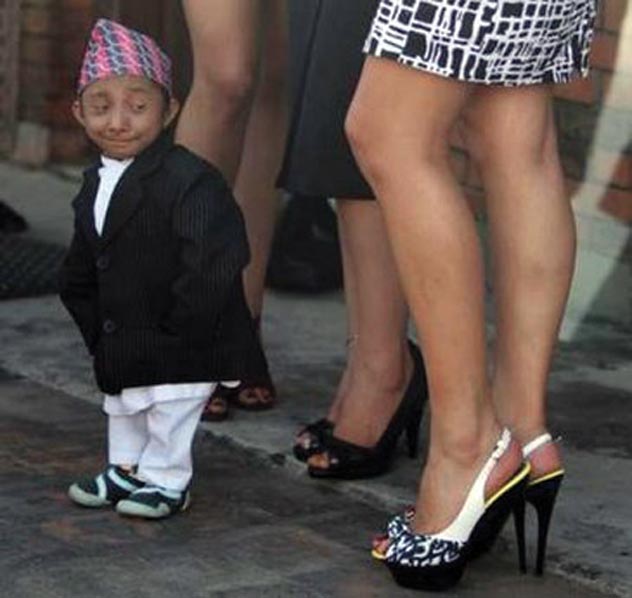 Khagendra Thapa looks at the legs of Miss Nepal beauty pageant winners. The Nepal Tourism Board has nominated Thapa and Miss Nepal beauty pageant winners as goodwill ambassadors to promote tourism in Nepal. Khagendra Thapa looks at the legs of Miss Nepal beauty pageant winners. The Nepal Tourism Board has nominated Thapa and Miss Nepal beauty pageant winners as goodwill ambassadors to promote tourism in Nepal.
A Nepalese fruit seller's son with the body of a toddler turned 18 and was officially declared the world's shortest man by Guinness record officials.
Khagendra Thapa Magar measured in at 26.4 inches (67 centimeters), displacing the former record holder, Edward Nino Hernandez of Colombia, who measures 27 inches (70 centimeters).
Cheers went up when Magar was handed a world record certificate by Guinness official Marco Frigatti. The ceremony was held in a hotel in Pokhara, Magar's hometown and a popular tourist destination west of Kathmandu.
Magar's family has campaigned for years to get him the crown, but earlier requests to Guinness were rejected because of the possibility he might grow.
"We are very proud of our son," said his father, Rup Bahadur Thapa Magar. "We have been finally recognized and our dreams have finally come true."
Magar and his family excitedly welcomed journalists to their home, where Magar jumped on the kitchen table and made tea for the visitors and family members. He also received presents for his 18th birthday and danced to the sound of a toy drum.
Magar, who weighs just over 12 pounds, was tiny even at birth, weighing just 1.3 pounds. His father says he has no explanation for why he never grew taller — his younger brother is a normal height for a boy of 13.
Local doctors are stumped, but lack facilities for detailed testing.
Magar's doctor for the past five years says he has the body of a 3-year-old.
"His body structure is like that of a small child and he also thinks and behaves in that manner," Hum Prasad Newpane said.
|TOP|
Bangladesh, India Most at Risk from Climate Change
Bangladesh and India are the countries most vulnerable to climate change, according to an index that rates the Nordic region least at risk.
British consultancy Maplecroft said its rankings showed that several "big economies of the future" in Asia were among those facing the biggest risks from global warming in the next 30 years as were large parts of Africa.
It said poverty and large low-lying coastal regions prone to floods and cyclones were among factors making Bangladesh the most exposed country. India, in second place, was vulnerable because of pressures from a rising population of 1.1 billion.
Madagascar was in third place, followed by Nepal, Mozambique, the Philippines, Haiti, Afghanistan, Zimbabwe and Myanmar. Vietnam, in 13th place and flood-hit Pakistan in 16th were also in the most exposed group.
"Understanding climate vulnerability will help companies make their investments more resilient to unexpected change," wrote Matthew Bunce, principal analyst at Maplecroft, who noted that many Asian countries were attracting large investments.
Norway was bottom of the list of 171 nations, least vulnerable ahead of Finland, Iceland, Ireland, Sweden and Denmark — all rich north European nations which may initially gain from factors such as longer crop growing seasons.
|TOP|
Back to School
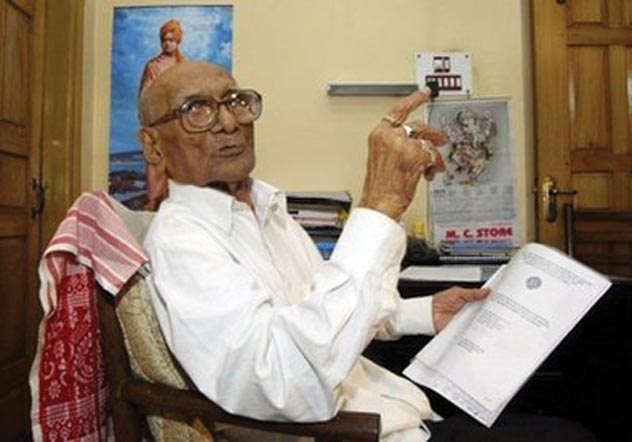 Bholaram Das Bholaram Das
An Indian man who just entered his 100th year and retired as a court judge 39 years ago has enrolled at university, insisting it is never too late to learn.
"There is no age limit for acquiring knowledge," Bholaram Das told AFP in the northeastern city of Guwahati, where he will pursue a doctorate on the role his native village played in the spread of a particular stream of Hinduism.
Das, who has five sons, one daughter, 10 grandchildren, and a great-grandchild, was born Oct. 16, 1911, when India was a British colony, and turned 99 this weekend.
"I had a very fulfilling 100 years, having been a teacher, dabbled with politics by joining the Congress Party in 1945, became a lawyer, then a magistrate, and retired as a judge in 1971," Das said.
"A 100-year-old student is indeed a rarity anywhere in the world," Guwahati University Vice Chancellor Okhil Kumar Medhi said.
|TOP|
Karachi Death Toll 52
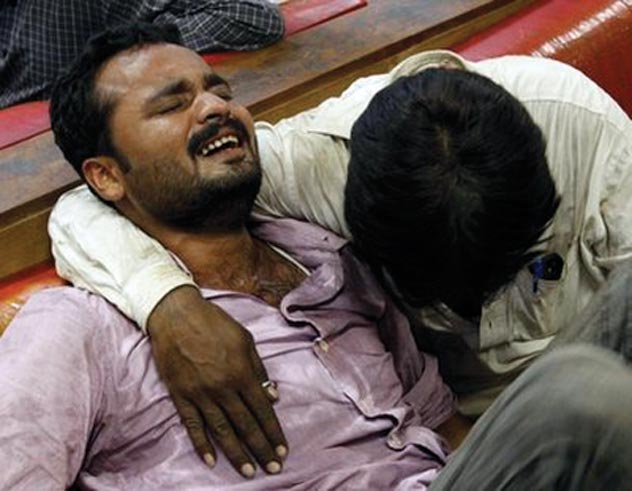 Relatives of shooting victims mourn outside a local hospital in Karachi. Relatives of shooting victims mourn outside a local hospital in Karachi.
The death toll from four days of violence sparked by a contentious local election in Pakistan's largest city rose to 52 Oct. 22 when at least one person was shot and killed despite efforts to restore order.
Security forces patrolled Karachi to prevent fresh violence and in many neighborhoods, businesses shut down while public transportation was scarce.
"The atmosphere of terror is everywhere," said local resident Mohammad Sadiq. "People are scared to come out of their houses."
Many of the slayings in Karachi — including the ones that started Oct. 16 evening — have been linked to gangs allegedly controlled by political parties. This wave of violence coincided with an election to replace a provincial lawmaker killed in August.
Karachi, a port city of about 16 million, has a long history of political, ethnic and religious strife. But this year has been exceptionally bloody. The city has seen around 300 targeted killings, mostly among the gangs, since June. That is roughly twice the number for all of 2009.
Despite heavy security, crowds angry over the recent killings set fire to several fruit and vegetable stalls in Malir, a neighborhood on the outskirts of the city where five men were shot. It was not immediately clear who fired the shots.
One of the five men was killed and four were wounded, said Seemin Jamali, a doctor at the largest public hospital in the city. She could not provide any details about the person killed.
|TOP|
U.S. Applauds India's Election
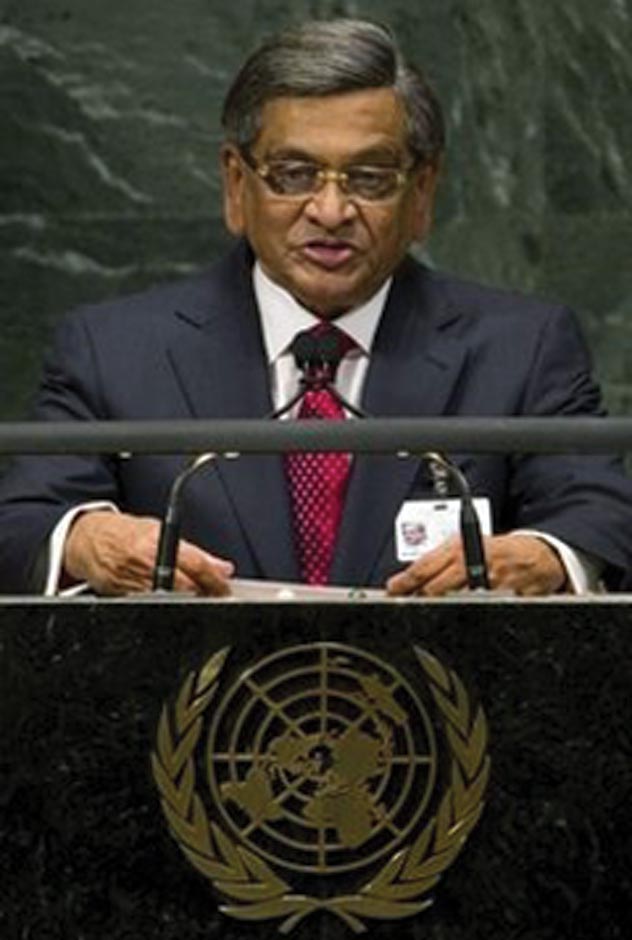 Indian Foreign Minister S.M. Krishna delivers his address during the 65th session of the General Assembly at the United Nations in New York. Indian Foreign Minister S.M. Krishna delivers his address during the 65th session of the General Assembly at the United Nations in New York.
The United States has applauded India's election to the United Nations Security Council as a non-permanent member.
Washington also hoped that New Delhi would play a constructive role in resolving key global issues, said P.J. Crowley, State Department spokesman, during a news conference in Washington.
In reply to a query asking if the U.S. would be endorsing India's bid for a permanent UN Security Council seat during the visit of U.S. President Barack Obama to New Delhi in November, the spokesman said the Obama administration is committed to the reform of the UN and its Security Council.
|TOP|
Fonseka Loses Seat
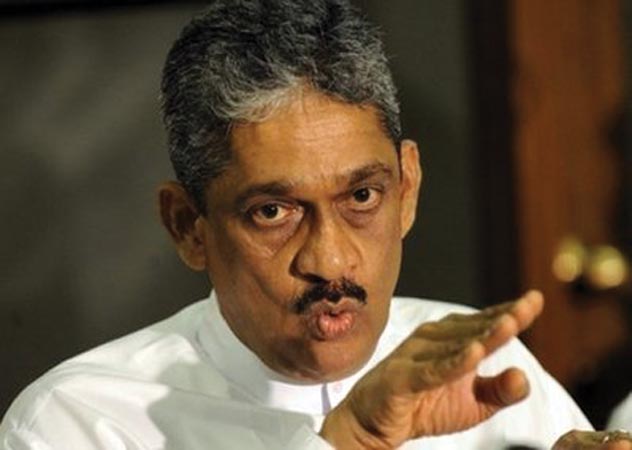 Sarath Fonseka Sarath Fonseka
Sri Lanka's ex-army chief and opposition leader Sarath Fonseka has lost his seat in parliament following his conviction by a military court, an official said.
Parliamentary Secretary Dhammika Dissanayake said Fonseka, who leads the Democratic National Alliance, had ceased to be an MP when he began his 30-month jail term a week ago.
Fonseka, who has been in custody since February, was allowed out to attend parliamentary sessions, using them as a platform to criticize the government for suppressing civil rights and freedoms.
"The elections commissioner has been informed of the vacancy," a parliamentary official said. There will be no by-election to fill the vacancy, but another candidate from Fonseka's party can be appointed to replace him.
Fonseka fell out with President Mahinda Rajapakse after the army's crushing defeat of Tamil rebels in May last year.
His wife Anoma Fonseka joined hundreds of Buddhist monks in staging a religious protest demanding the release of the former four-star general.
Buddhist monks and their supporters prayed outside the Temple of the Tooth in the central town of Kandy in a peaceful demonstration of solidarity with jailed Fonseka, witnesses said.
Fonseka's party is preparing to appeal to a civilian court against the court martial which found him guilty Sept. 17 of violating procurement procedures when he was the army chief.
Fonseka was hailed as a hero after soldiers under his command crushed the Liberation Tigers of Tamil Eelam last year. Tamil separatist leaders were killed in a no-holds-barred offensive led by Fonseka.
The Tigers' defeat ended nearly 40 years of separatist conflict in Sri Lanka, but rights groups led by Amnesty International say thousands of civilians were also killed in the final onslaught.
Fonseka's conviction came after he was stripped of his rank and pension following another court martial that found him guilty in August of dabbling in politics while in uniform.
Fonseka was arrested two weeks after he failed to unseat Rajapakse at a presidential election. However, he won a seat in parliamentary elections in April, allowing him to attend the legislature.
|TOP|
Malaria Kills 200K Yearly
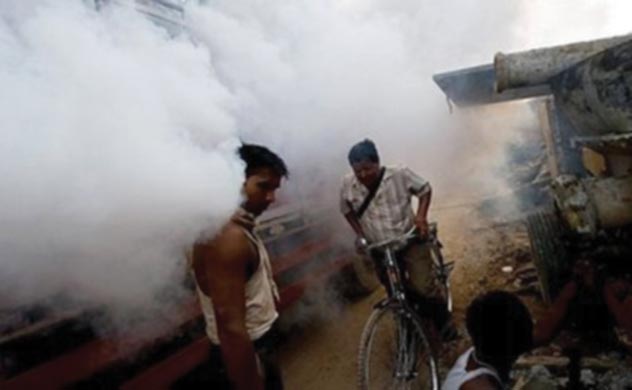 Workers walk past as municipal workers fumigate in New Delhi. Malaria kills 13 times more people in India than UN estimates. Workers walk past as municipal workers fumigate in New Delhi. Malaria kills 13 times more people in India than UN estimates.
Malaria kills more than 200,000 people in India each year, 13 times higher than UN estimates, according to a paper published online by The Lancet.
The UN's World Health Organization says that the malarial death toll in India, the most populous country where the disease is endemic, is around 15,000 annually, comprising 5,000 children and 10,000 adults.
But the new study says the WHO's reporting method is flawed, as it depends indirectly on patients who have been diagnosed by a doctor.
Many deaths in India occur at home, rather than in a hospital or a clinic, which means the underlying cause of many malaria fatalities is likely to be misattributed, it says.
Investigators sent out field workers to 6,671 randomly-selected areas of India to interview relatives or careworkers of 122,000 people who had died between 2001 and 2003.
The field workers sent back a half-page report on each case as well as answers to specific questions which were asked if the individual had died of a fever.
This data was then analyzed separately by two physicians, who each gave an independent opinion of the underlying cause of death. A review board adjudicated in cases where there was a dispute.
The doctors determined that 3.6 percent of deaths they attributed among people aged one month to 70 years occurred from malaria. Ninety percent of these happened in rural areas and 86 percent occurred outside of a health-care facility.
The fatality estimates coincided geographically with local transmission rates compiled by the Indian malarial control program, they found.
Extrapolated nationwide, malaria kills 205,000 people a year before the age of 70, comprising 55,000 in early childhood, 30,000 at ages five to 14 and 120,000 at ages 15 to 69, according to the report.
|TOP|
Rights Groups Won’t Testify
Three international rights groups have declined to testify before a government-appointed commission inquiring into Sri Lanka's civil war, saying it lacks independence and has no mandate to investigate alleged war crimes.
Human Rights Watch, International Crisis Group and Amnesty International have jointly written to Sri Lanka's Lessons Learnt and Reconciliation Commission to decline invitations to testify, a statement said.
The groups contend the commission would not operate independently because its members were appointed by the government; moreover, the body had no real mandate to probe alleged war crimes reported in the last stages of the war.
The commission also lacks any mechanism to protect witnesses and falls short of minimum international standards of a commission of inquiry.
"There is little to be gained by appearing before such a fundamentally flawed commission," Kenneth Roth, executive director of Human Rights Watch, said in a statement. "Accountability for war crimes in Sri Lanka demands an independent international investigation."
Sri Lankan forces crushed the Liberation Tigers of Tamil Eelam group last year, ending their quarter-century campaign for an independent state for Sri Lanka's ethnic minority Tamils.
But human rights groups say there were very high civilian casualties and accused both sides of violating basic human rights as the war ended. According to the United Nations, more than 7,000 civilians were killed in the last five months of the conflict alone.
|TOP|
Work Begins on Jewish Center
The Jewish center that was attacked by gunmen in Mumbai in November 2008 is being renovated.
Nariman House was one of the sites under siege for more than 40 hours when 10 gunmen attacked Mumbai. More than 170 people died in the attacks.
The parents of Rabbi Gavriel Nocah Holtzberg and his wife Rivkah are taking care of the premises.
The couple were among six people taken hostage and killed by two gunmen at the center.
Both gunmen were eventually killed.
The renovated center will be open to the public in a few months and will have a memorial to the murdered rabbi and his wife.
"The terrorists may have murdered Gabi and Rivki, but they will not be able to end their work or their legacy. We won't allow it — that's why we are currently putting together the plan," said Rabbi Yosef C. Kantor, the official responsible for the rebuilding effort.
Nariman House is run by a New York-based Orthodox Jewish organization called Chabad Lubavitch, which currently operates from an undisclosed location in Mumbai because of what it sees as a continued security threat.
Rabbi Holtzberg's and Rivkah's son, Moshe, miraculously survived the attack along with the family's maid and family cook.
His grandparents and the maid, Sandra Samuel, who was honored by Israel for saving his life, are looking after him and he will eventually inherit the premises, said Eliran Russo, their representative in Mumbai.
|TOP|
Polls Open in Bihar
Polls have opened amid tight security in Bihar.
The ruling regional leader Nitish Kumar's Janata Dal (United) leads a coalition government with the Bharatiya Janata Party in the state.
Pitted against him are a clutch of other regional parties and the Congress Party.
Bihar is one of India's poorest and most corrupt states, though many believe that under Kumar the state has turned the corner.
The election to the 243 seats in the assembly of the state will happen in six stages staggered over a month.
Early reports say that polling is brisk in most of the 47 constituencies which have gone to the polls.
Kumar's coalition is facing opposition from a regional coalition spear-headed by the Rashtriya Janata Dal, led by Lalu Prasad Yadav, former federal railway minister.
Kumar has pledged to transform Bihar into a "developed state" by 2015, asking voters for a second term to improve its infrastructure, health, and investment profile.
His government says that Bihar clocked up a growth rate of 11.03 percent in 2008-2009, which would make it India's second fastest growing state economy, just behind Gujarat.
But critics question this claim, saying last year's economic survey — a federal government publication — showed the growth rate was just 5 percent.
|TOP|
|
|
|
|
|
|